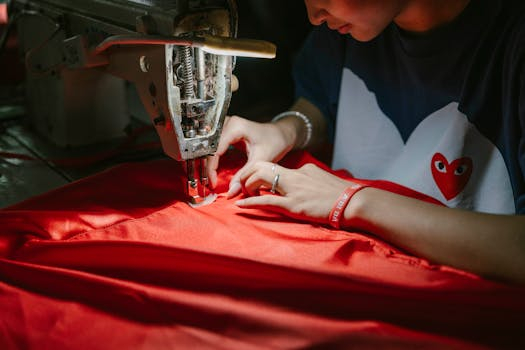Blockchain Fashion Platforms Ensure Transparent Production Processes
The fashion industry has a major visibility issue when it comes to production processes. With garments often being produced in unethical and unsustainable ways, consumers are demanding more transparency from their favorite brands. This growing concern has led to the rise of blockchain fashion platforms, which aim to ensure a more transparent and responsible production process. By leveraging the power of blockchain technology, these platforms are revolutionizing the way fashion is made, allowing for greater traceability and accountability. In this article, we will explore how blockchain fashion platforms are transforming the industry and ensuring a more sustainable future for fashion.
What is Blockchain Technology?
Before diving into the world of blockchain fashion platforms, it’s important to understand what blockchain technology is. In simple terms, blockchain is a decentralized digital ledger that records transactions across a vast network of computers. Each “block” in the chain contains a list of recent transactions and once completed, is added to the chain. This creates a secure and immutable record of all transactions that cannot be altered or deleted.
The Role of Blockchain in Fashion
The fashion industry is notorious for its opaque supply chain, with many brands outsourcing production to third-party factories in developing countries. This lack of transparency makes it difficult for consumers to know the true origin of their clothing and if it was ethically produced. This is where blockchain technology comes in, providing a solution to the industry’s transparency problem.
Traceability of Materials
With blockchain fashion platforms, all stages of the production process are recorded on the blockchain, from sourcing raw materials to manufacturing and shipping. This means that every step is traceable, providing consumers with valuable information about the materials used in their clothing. This not only ensures transparency but also helps eliminate the potential for counterfeit products to enter the market.
Supply Chain Accountability
Blockchain technology also allows for complete supply chain accountability. By tracking each stage of production, any ethical or environmental violations can be easily detected and addressed. This creates a more responsible and sustainable fashion industry, as brands are held accountable for their actions.
The Benefits of Blockchain Fashion Platforms
Beyond the improved transparency and accountability, there are many other benefits to using blockchain technology in the fashion industry.
Reduced Environmental Impact
With accurate tracking of production processes, brands can measure their carbon footprint and identify areas for improvement. This not only helps reduce their impact on the environment but also allows for more sustainable practices to be implemented.
Better Working Conditions
Blockchain fashion platforms also promote better working conditions for garment workers. By providing transparency throughout the supply chain, brands can ensure that labor laws and fair wages are being upheld in every step of production.
Improved Consumer Trust
As consumers become more conscious of the environmental and social impact of their purchases, they are demanding more transparency from the brands they support. By using blockchain technology, fashion companies can build trust with their consumers by providing them with the information they need to make informed and ethical purchasing decisions.
Real-Life Examples
Several fashion companies have already implemented blockchain technology into their production processes. One notable example is the luxury fashion brand Burberry, which partnered with the blockchain platform Everledger to track the authenticity of its products. Other brands, such as H&M and Nike, are also exploring the use of blockchain to increase transparency and sustainability within their supply chains.
Challenges to Overcome
While blockchain fashion platforms offer many benefits, there are still some challenges to overcome in order for it to become widely adopted in the industry.
Cost and Complexity
Blockchain technology is still relatively new and can be complex and expensive to implement. This can be a barrier for smaller fashion companies with limited resources.
Data Privacy Concerns
As blockchain technology involves sharing sensitive data on a public ledger, there are concerns about data privacy and security. Companies must ensure that proper measures are in place to protect their data and the data of their consumers.
In Conclusion
Blockchain fashion platforms are transforming the way fashion is produced, creating a more transparent and sustainable industry. By promoting traceability, accountability, and better working conditions, these platforms are not only beneficial for fashion companies but also for consumers and the environment. While there are still challenges to overcome, the future looks bright for blockchain technology in the world of fashion.











